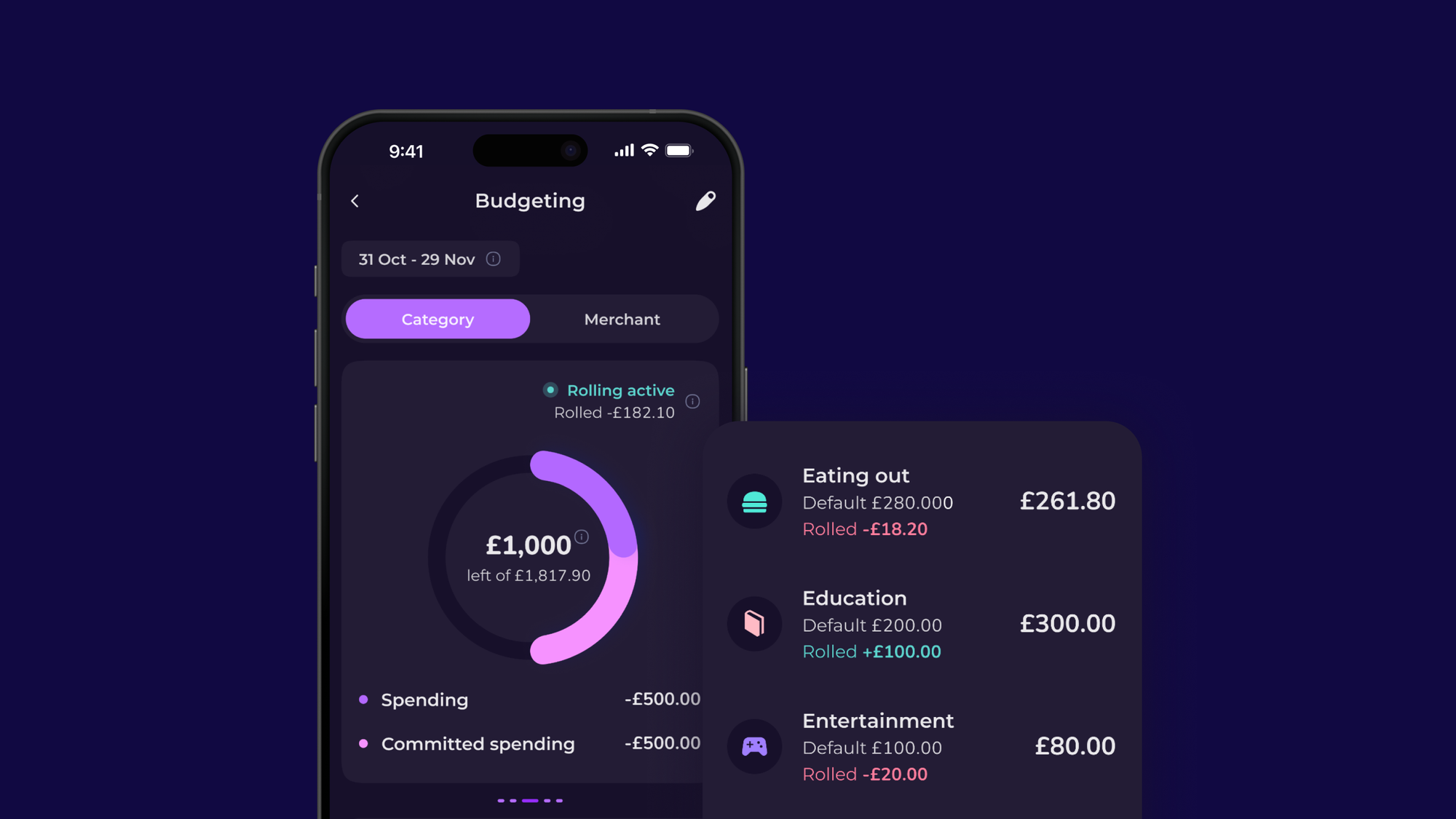FEATURED ARTICLE
This Is Why You Should Talk About Your Money

Rebekah May
November 17, 2020 •7 min read
TABLE OF CONTENTS
Money And Stress
Opening Up About Money
Building Your Support Bubble
The Pros Of Talking About Money
Your Money Action Plan
Wrapping Up Our Discussion
Talking about money has always been a tricky subject and new data released shows just how difficult us Brits find it.
Younger generations, in particular, find it more difficult than most – maybe we’re too busy talking about avocados and flat whites..? Glossing over that irritating stereotype, shall we find out more about this data?
The data we are considering is research conducted by the Money and Pensions Service into the personal finance behaviours of Brits. The objective of this research was to discover how many people keep money secrets from their loved ones.
Now money secrets sound slightly ambiguous, so let’s clarify what this means. Firstly, in no sense does money secrets refer to anything untoward, as if you’d think that… Instead, it refers to hiding financial products or problems. Items like credit cards, overdrafts, and loans to name a few. With this in mind, it’s time to run through the numbers.
The headline figure is this: UK adults have kept at least 21 million financial products secret from their loved ones; that’s a startling statistic.
Accompanying this figure is an even gloomier picture, where 38% of people stay silent about money worries. Embarrassment or fear of being judged, cited as reasons for their silence.
It is clear from these two statistics alone that money is one of the last remaining taboos in the UK – but it really shouldn’t be. The purpose of this article is therefore to present why we all need to talk about money.
Money And Stress
It will be no surprise for you to read that money is a big cause of stress for many people. A report conducted by Growth for Knowledge in 2015 showed that money was the major cause of stress globally for 29% of people.
When we combine this report with the numbers associated with money secrecy, we can see a concerning pattern emerging. Many people are worried about money, but they are not talking about it.
This trend is compounded by data from the Money and Pensions Service which says that 29 million adults do not feel comfortable talking about money, with 48% of these admitting to having money worries.
Money worries cause stress, and stress is a big problem. It can consume our lives, leave persistent doubts, and change how we act. Feeling stressed impacts on both our psychological and physical health – impacting on our overall wellbeing. We need to change this.
Now we have the facts in front of us, our attention can turn to what we can do about it. The best way to start dealing with money stress is to talk about it.
Opening Up About Money
One of the most surprising details we have discussed so far is how many people are keeping money secrets from those closest to them.
The fact that 29 million adults do not feel comfortable talking about money, clearly shows that the benefits of talking about money aren’t known.
But, campaigns like Talk Money Week are trying to change this. Talk Money Week is an initiative designed to raise awareness of the importance of talking about money and how opening up about money can help overcome the stresses that people face.
For this year's Talk Money week Emma published a list of finfluencers (financial influencers) that people should follow on Instagram. These financial experts are extremely active on social media, and they are doing excellent work in normalising money conversations.
Building Your Support Bubble
If you're ready to talk about money with people you trust, start by building your support bubble.
Remember the incredibly catchy High School Musical song "We're all in this together"? Well, think of this when it comes to discussing money. Coming together can help overcome adversities and result in more favourable outcomes.
Despite the questionable reference, there is a valid point in there.
All problems and worries become more manageable when we open up about them. In the instance of money stresses, this is particularly true.
As we’ve touched on, there is a stigma associated with money stresses, where people feel embarrassed to own up to them. But by talking about them with those closest to us, any problems we're facing suddenly seem more manageable. A problem shared is a problem halved, after all.
You might also find that talking to someone about your financial worries changes your focus. Rather than reflecting and feeling guilt, you become proactive and identify ways that you can remedy problems.
The Pros Of Talking About Money
1. Reduces Stress
When we open up about money with those we trust, the clouds above our heads begin to lift – we become happier. A weight has been lifted which allows us to be ourselves. Stress impacts our psychological and physical health; reducing its grip on us is essential for our wellbeing.
2. Builds Stronger Relationships
But it’s not just us that are affected by our stress. Our actions – understandably - are influenced by stress, which can spill over to strain our relationships. However, research shows that talking about money can help build stronger relationships – one of the many reasons why we need to talk about money.
3. Helps You To Feel More In Control
The overriding emotion that is felt when opening up on money, is one of being in control. The fear of the unknown is a problem many of us wrestle with, but all we can do is put ourselves in a position to tackle it. That’s why when we talk about money, we not only feel more in control, but we also make better money decisions.
Rather than an overbearing feeling of treading water, instead we can better allocate our money to no longer paper the cracks and in effect, start again with a fresh, new approach. We have greater clarity for what we need to achieve and a more coherent train of thought.
4. You'll Make Better Financial Decisions
Feeling more in control of our money then leads to better decisions. We are less likely to make risky money moves and instead focus on what we need to achieve. Talking about money externalises the problems and allows us to build priority lists with the support of those we trust. Meaning we are not overcoming money problems alone.
5. Builds Financial Resilience
As if it couldn’t get any better, talking about money also helps to build financial resilience, a greater financial knowledge and allows us to prepare ourselves for future financial shocks or curveballs. There’s a lot of benefits to talking about money.
But once we have opened up about money, what can we do to help our financial situations? The answer lies in three steps: prioritise repaying debt, set a budget and build an emergency fund.

Your Money Action Plan
1. Debt
Debt is normally the factor that most people worry about and unfortunately, there is a good reason for this. Data from The Money Charity shows that as of the end of August 2020, the average credit card debt per person in the UK was £2,241, where the average credit card interest rate is around 20%.
Left to its own devices, debt can spiral out of control. That’s why it's so important to stop it in its tracks, by paying off any outstanding debt as soon as possible. Repaying debt has to be the first priority, as this is where most problems lie.
In order to help the prioritisation of debt, we need to meet our companion in the battle against money worries – a budget.
2. Create A Budget
Now I know you know what a budget is, but they’re too vital not to talk about. Budgets are financial plans which give us greater control over our finances. They allow us to give each penny a purpose.
Let’s face it, budgeting can be a bit tedious, but thankfully we have a product to help us (we only need to consider the webpage domain we are on to know what this is going to be). Of course, it is the Emma app.
Emma makes budgeting straight forward, helping us to build the picture of what we spend our money on, identifying where we can cut back and what we can cut out. Having a tool analyse our personal finances for us, helps establish financial control through a realistic budget. I.e. one we will stick to.
With our budget tailored to our finances, we can work on repaying our debt and latterly building our emergency fund. You’ve heard the phrase ‘saving for a rainy day’ haven’t you? This is the concept that underpins what an emergency fund is.
3. Start An Emergency Fund
An emergency fund is a pot of money that we have as a financial buffer for when times get tough; such as a loss of income or unexpected costs arising. Emergency funds are essential in times of uncertainty, times like now when a global pandemic is causing economic pain to many. An emergency fund adds financial resilience to your finances.
Wrapping Up Our Discussion
Money is a big cause of stress for many people, 29% of people globally in fact. Combined with this is the persistent stigma of talking about money and how many people don’t talk about it for fear of judgement. Meaning that money is still a taboo subject for us Brits. It really, really shouldn’t be, because talking about money helps us in many ways; as we’ve seen.
Opening up about money to those we trust is essential - as it not only builds a support bubble around us - but also helps us to feel more in control of our finances. Feeling in control ensures we make better financial decisions, take less risk, and are able to prioritise addressing the problem – rather than just papering the cracks. For all its benefits, not enough people are talking about money. This needs to change and hopefully, this article contributes to the talk money movement. Thanks for reading.
This article has been written by Will from Wiservest. Will is a chartered wealth manager who helps people manage their money, understand investing, and become financially confident. Check out the Wiservest blog, Twitter, or Facebook page.
Emma is a money management app that connects all your bank accounts to track your monthly spending and subscriptions. Emma will help you visualise and take control of your finances. Make sure you aren’t overspending and show you practical steps to start budgeting effectively. Download Emma today.
You may also like
Check out these related blog posts for more tips
© 2025 Emma Technologies Ltd. All Rights Reserved.
Emma is registered and incorporated in England and Wales.
Emma Technologies Ltd is an appointed representative of RiskSave Technologies Ltd, which is authorised and regulated by the Financial Conduct Authority (FRN 775330).
Payment services (Non MIFID or Deposit related products) for Emma Technologies Ltd are provided by The Currency Cloud Limited. Registered in England No. 06323311. Registered Office: Stewardship Building 1st Floor, 12 Steward Street London E1 6FQ. The Currency Cloud Limited is authorised by the Financial Conduct Authority under the Electronic Money Regulations 2011 for the issuing of electronic money (FRN: 900199). For more detail on how your money is protected please see here. You can also find Currency Cloud's Terms of Use here.
Emma Technologies is an Introducer Appointed Representative of Quint Group Limited and not a lender. Quint Group Limited is authorised and regulated by the Financial Conduct Authority (Firm Reference Number 669450). Monevo Limited is an Appointed Representative of TransUnion International UK Limited. TransUnion is authorised and regulated by the Financial Conduct Authority (Firm Reference Number 737740). Emma Technologies introduces customers first to Quint Group Limited, as a licensed credit broker, who then refers on to Monevo Limited.
Emma is registered with the Financial Conduct Authority under the Payment Services Regulations 2017 for the provision of payment services.
Financial Conduct Authority Reg Nr: 794952.
Company Registration Number: 10578464.
Data Protection Registration Number: ZA241546.
All testimonials, reviews, opinions or case studies presented on our website may not be indicative of all customers. Results may vary and customers agree to proceed at their own risk.
Resources: Cancel subscriptions, Cashback offers, Who charged me, Rent Reporting, Budgeting, Investment universe, Emma vs Moneyhub.
Featured cashback offers: Samsung, SimplyCook, NordVPN, Audible, M&S Homeware.









